Grievance Letter For Unfair Treatment
[Your Name]
[Your Address]
[City, State, ZIP Code]
[Email Address]
[Phone Number]
[Date]
[Recipient's Name]
[Recipient's Position]
[Company/Organization Name]
[Company/Organization Address]
[City, State, ZIP Code]
Dear [Recipient's Name],
Subject: Formal Grievance Regarding Unfair Treatment
I am writing to formally address a matter of serious concern regarding the unfair treatment I have been experiencing within [Company/Organization Name]. I believe it is crucial to bring this issue to your attention in order to seek a resolution and ensure a fair and equitable work environment for all employees.
I have consistently observed and experienced a pattern of unfair treatment in the following ways:
1. **Specific Incident(s) of Unfair Treatment**: Describe in detail the incidents of unfair treatment that you have experienced or witnessed. Provide dates, times, locations, and names of individuals involved. Be objective and concise, focusing on the facts.
2. **Violation of Company Policies and Procedures**: If applicable, outline how the unfair treatment you experienced violates established company policies and procedures. Reference any relevant sections of the employee handbook or code of conduct.
3. **Impact on Work Performance and Well-being**: Explain how the unfair treatment has affected your job performance, emotional well-being, and overall work environment. Use specific examples to illustrate the negative impact on your ability to perform your duties effectively.
4. **Previous Attempts to Resolve the Issue**: Briefly describe any previous attempts you have made to address the issue informally, such as discussing the matter with your supervisor or HR department. If these attempts were unsuccessful, mention them and explain why you are now escalating the matter to a formal grievance.
5. **Desired Resolution**: Clearly state what you expect as a resolution to the issue. This could include actions such as a formal investigation, mediation, corrective actions, or changes to company policies. Be reasonable and realistic in your expectations.
I firmly believe that a fair and respectful workplace is essential for both individual and organizational success. I am committed to working collaboratively towards a resolution that promotes a positive work environment for all employees.
I kindly request a prompt and thorough investigation into this matter. I am willing to participate fully and provide any additional information that may be required during the process. I trust that [Company/Organization Name] will take the necessary steps to address this grievance seriously and promptly.
I appreciate your attention to this matter and look forward to a timely response. Please acknowledge receipt of this letter at your earliest convenience.
Thank you for your understanding and cooperation.
Sincerely,
[Your Signature]
[Your Printed Name]
Enclosure: [If applicable, list any documents or evidence you are including with the letter, such as witness statements or relevant emails.]
cc: [List names and positions of individuals you are copying on the letter, such as HR representative or higher management]
Formal Grievance Letter For Unfair Treatment
Subject: Grievance Regarding Unfair Treatment
Dear [Manager's Name],
I am writing to formally raise a concern regarding what I believe to be unfair treatment in the workplace. On multiple occasions, including [specific dates or events], I have experienced [describe specific unfair treatment or actions].
This treatment has affected my ability to perform my duties effectively and has created a challenging work environment. I respectfully request a thorough review of these incidents and appropriate action to ensure a fair and professional workplace.
Thank you for your attention to this matter.
Sincerely,
[Your Name]
[Your Position]
Casual / Friendly Grievance Email
Hi [Supervisor's Name],
I wanted to bring to your attention a few issues I’ve been facing at work that I feel are unfair. Specifically, [describe situation briefly].
I hope we can discuss this soon to find a fair solution. I appreciate your understanding and time.
Best regards,
[Your Name]
Heartfelt Grievance Letter
Dear [HR Manager's Name],
I am compelled to write this letter due to repeated instances of unfair treatment I have encountered at work. The situation has caused me significant stress and has impacted my ability to perform effectively.
I kindly request that my concerns be taken seriously and that steps be taken to ensure equitable treatment moving forward. I am hopeful for a positive resolution.
Sincerely,
[Your Name]
[Your Position]
Quick / Simple Grievance Email
Hello [Manager's Name],
I am writing to report an incident of unfair treatment that occurred on [date]. I request that this issue be reviewed promptly.
Thank you,
[Your Name]
Grievance Letter Regarding Discrimination
Dear [HR Manager's Name],
I am formally raising a grievance concerning discriminatory behavior I have experienced from [person/department] on [specific dates]. The incidents include [briefly describe incidents].
This behavior is affecting my work performance and overall wellbeing. I respectfully request a thorough investigation and appropriate remedial measures.
Sincerely,
[Your Name]
[Your Position]
Grievance Letter Concerning Unfair Workload
Dear [Supervisor's Name],
I wish to formally address a concern regarding the distribution of work within our team. I have been consistently assigned tasks beyond my capacity, while others receive lighter workloads. This imbalance has impacted my efficiency and morale.
I request a review of task allocation and appropriate adjustments to ensure fairness among all team members.
Thank you for your attention,
[Your Name]
[Your Position]
Provisional / Preliminary Grievance Letter
Dear [HR Manager's Name],
This letter serves as a preliminary grievance regarding incidents of unfair treatment I have observed in the workplace. While I am still gathering detailed information, I felt it necessary to notify you promptly.
I request acknowledgment of this concern and guidance on the next steps for a formal review.
Sincerely,
[Your Name]
[Your Position]
What / Why do you need a Grievance Letter For Unfair Treatment
A grievance letter for unfair treatment is a formal document submitted by an employee to raise concerns about mistreatment or inequitable practices at work.
Purposes include:
- Documenting incidents of unfair treatment.
- Requesting corrective action from management or HR.
- Protecting the employee's rights and well-being.
- Establishing a formal record of complaints for future reference.
Who should send a Grievance Letter For Unfair Treatment
- Any employee experiencing unfair treatment, discrimination, harassment, or inequitable workload.
- Temporary, part-time, or full-time staff encountering adverse workplace conditions.
- Individuals who have tried informal resolution without satisfactory outcomes.
Whom should the Grievance Letter be addressed to
- Direct supervisors or managers responsible for the team.
- Human Resources or Personnel Departments for formal review.
- Company ethics or compliance officers, if relevant.
- Senior management when internal resolution is ineffective.
When to send a Grievance Letter
- After repeated instances of unfair treatment.
- When informal discussions or verbal complaints fail to resolve the issue.
- Immediately after serious incidents such as discrimination, harassment, or policy violations.
- Before escalation to external authorities or labor boards if internal resolution is required.
How to write and submit a Grievance Letter
- Clearly describe the incidents with dates, locations, and involved parties.
- Avoid emotional language; remain factual and professional.
- State the impact on your work or wellbeing.
- Specify the action or resolution you seek.
- Submit to the appropriate authority (HR, manager, or compliance officer) via email or printed letter.
- Keep a copy for personal records.
How many times should a grievance be submitted
- One formal letter per incident or closely related set of incidents is standard.
- Updates can be submitted if new evidence arises or situations escalate.
- Avoid multiple repetitive submissions for the same issue without new information.
FAQ about Grievance Letters For Unfair Treatment
- Q: Is it necessary to submit in writing?
A: Yes, written documentation ensures a formal record and proper review. - Q: Should I include witnesses?
A: Yes, mention witnesses if they observed the incidents, without revealing sensitive personal details unnecessarily. - Q: Can I send it via email?
A: Yes, especially if company policy allows digital submission, but retain a copy.
Requirements and Prerequisites
- Detailed account of unfair incidents, including dates, times, and persons involved.
- Evidence supporting claims, such as emails, reports, or witness statements.
- Familiarity with company grievance policies and reporting procedures.
- Professional tone and concise writing style.
Formatting guidelines for Grievance Letters
- Length: 1–2 pages, clear and concise.
- Tone: formal, professional, factual, and non-emotional.
- Structure: introduction, description of incidents, impact statement, desired resolution, closing.
- Mode: printed letter or PDF via email as per company policy.
- Etiquette: respectful language, no accusations beyond verifiable facts, avoid personal attacks.
After Sending / Follow-up
- Confirm receipt with HR or the concerned manager.
- Keep records of all communications regarding the grievance.
- Attend meetings or discussions scheduled by management regarding the grievance.
- Follow up respectfully if no response is received within a reasonable timeframe.
Pros and Cons of Sending a Grievance Letter
Pros:
- Creates a formal record of unfair treatment.
- May lead to corrective actions or policy changes.
- Protects the employee legally and professionally.
Cons: - May strain relationships if not handled professionally.
- Could escalate workplace tension temporarily.
- Requires careful documentation and thoughtful wording.
Compare and Contrast with Other Complaint Methods
- Verbal Complaints: Immediate but lack formal record.
- Anonymous Reports: Protect identity but may limit detailed investigation.
- Union Grievances: Involve third-party representation, may be more formal but powerful.
- Formal Letter: Provides documented evidence, clear and structured, often more effective for resolution.
Tricks and Tips
- Keep a detailed log of incidents before writing the letter.
- Focus on facts, not personal emotions.
- Specify the desired outcome clearly.
- Use neutral language and avoid inflammatory statements.
- Attach supporting evidence where possible.
Common Mistakes
- Using accusatory or aggressive language.
- Being vague or omitting key details.
- Failing to follow company grievance procedures.
- Submitting late or after excessive delay.
- Ignoring company hierarchy in addressing the letter.
Elements and Structure of a Grievance Letter
- Subject Line: Clearly indicate the grievance topic.
- Introduction: State purpose and context.
- Incident Description: Provide detailed facts, dates, and persons involved.
- Impact Statement: Explain how treatment affected work and wellbeing.
- Desired Resolution: Suggest possible solutions or remedies.
- Closing: Request acknowledgment and professional handling.
- Signature: Include name, designation, and contact details.
- Attachments: Include evidence such as emails, reports, or witness statements.
Does it require attestation or authorization
- Usually, the letter does not require external attestation.
- Internal authorization may be necessary if company policy mandates HR acknowledgment or managerial review.
- Ensure it aligns with official grievance policies for proper processing.

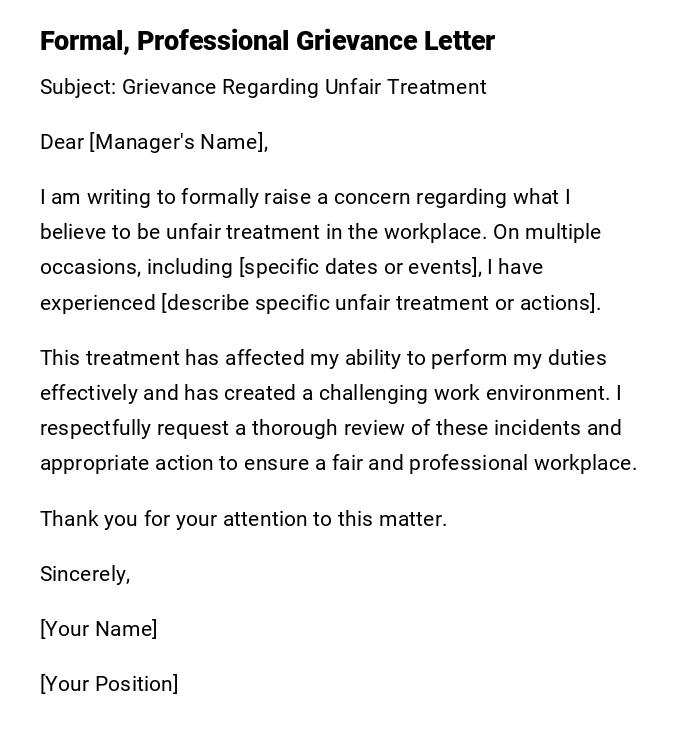
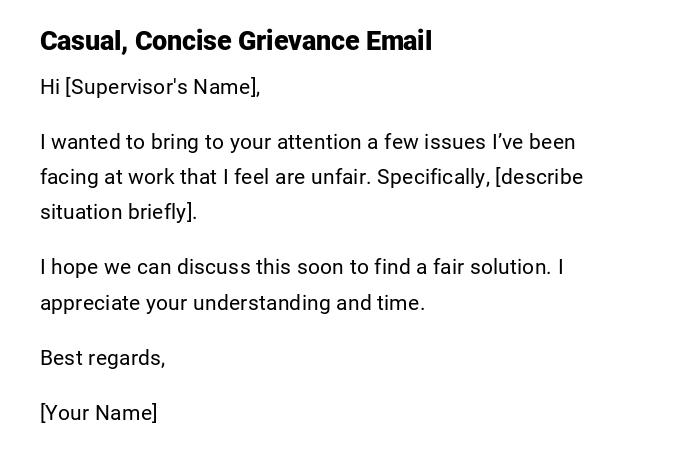
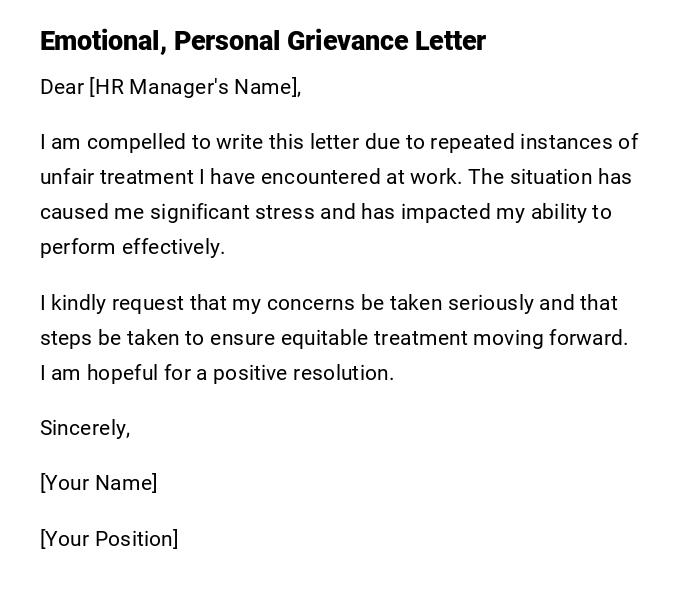
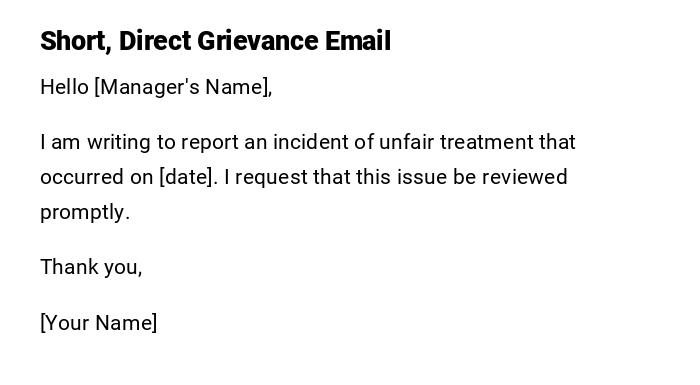
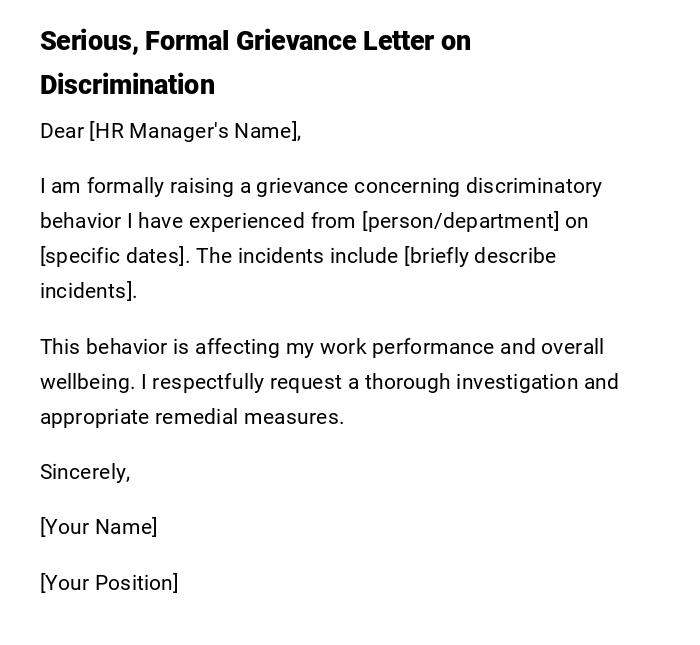
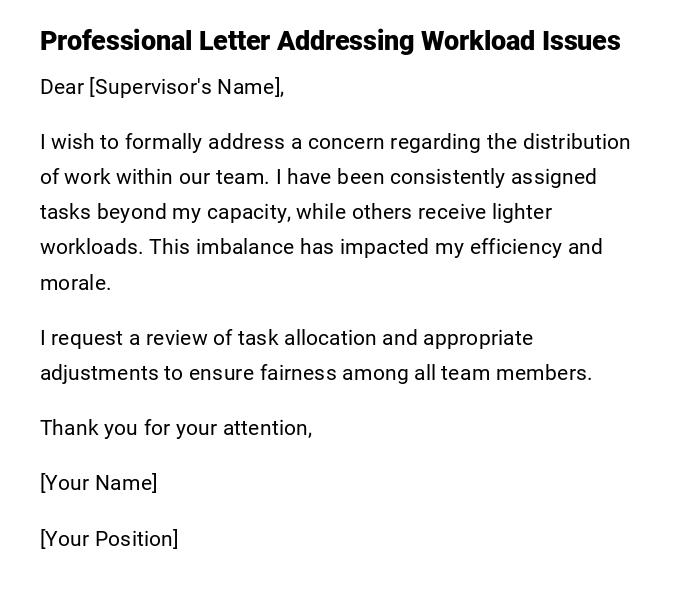
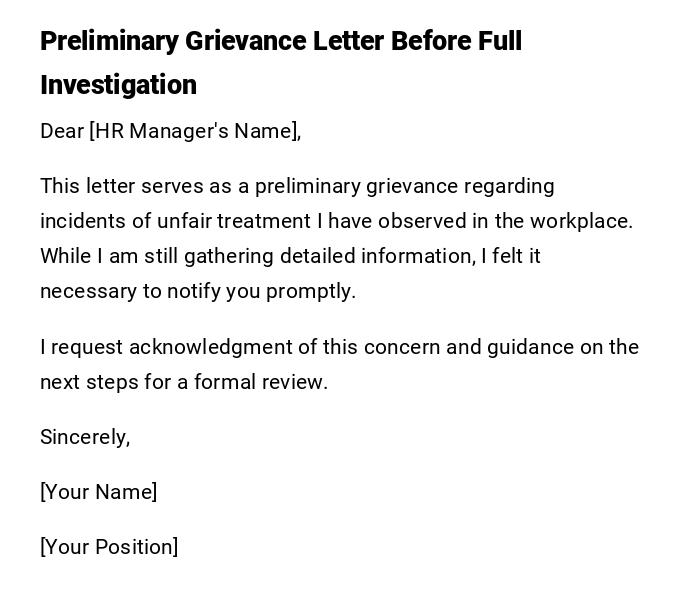

 Download Word Doc
Download Word Doc
 Download PDF
Download PDF